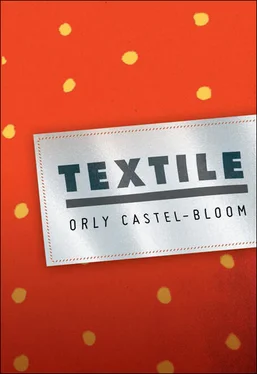Now all that was left him was to imagine himself telling her, and her murmuring intently: That’s terrible! That’s shocking, Dael! That’s incredible, Dael! Mainly she would have repeated his name again and again, Dael, Dael. She was the one who had chosen this name. Gruber had chosen Lirit’s name, and she had insisted on Dael’s.
They had an assassination. Everything proceeded according to plan until the moment when Dael shot at the center of the mass, saw the guy taking the bullet and not falling, shot again, and saw him taking the bullet and not falling, until in the end he fell. In the meantime they were being shot at, and he and his friends ran under fire to confirm the kill, and saw that the target was padded round the chest with a belt of Yellow Pages from every area of the country.
Dael had almost been killed by the shots fired at them. Do you understand? To die right after you, mother?
This was why he preferred to be a useless piece of pipe, etc.
At the end of this imaginary conversation he called Aya Ben-Yaish, in the hope that she would listen to him, and say something, maybe that it was a miracle he was alive, because it really was a miracle. Aya Ben-Yaish was not available, and Dael went to continue his breadth reading of Scott Fitzgerald, Homer, a biography of Moshe Dayan, and Primo Levi.
AT THE END of her morning conversation with her brother, Lirit felt a great emptiness. She didn’t have Mandy’s talent for throwing the right slogans into the air and bringing the man home in the space of a few hours.
Later on she raced north on the coastal road. The traffic was less heavy now than at eight, and she, unlike her mother, had no intention of getting up at the crack of dawn and arriving at the factory at half past six, seven. Those days were over. On the radio too they said that the northbound traffic was proceeding unimpeded, but that at some junction, not connected to her, oil had been spilled on the road.
Why had he fallen in love all of a sudden? What was really going on there? In the end, contrary to her previous decision, she called Bahat, even though over there it was maybe five in the morning. And the latter answered immediately, and listened to the young Israeli, who was trying to preach to her from a distance, and then Bahat said, “Honey, your father and I have only spent two nights together. I wanted to cheer him up, and I’m a woman too. Believe me, we both needed it. Your mother hasn’t had sex with him for years. He told me. Did you know? Did she have a lover?”
“Can I talk to him?” asked Lirit, who simply couldn’t believe her ears.
“He’s sleeping.”
“When he wakes up, tell him to call the factory urgently, or me on my cell phone!” she said, and only when she arrived at Nighty-Night, she noticed that the left-hand outside mirror had been ripped off the car.
SHE PARKED the big Buick next to the Singer technician’s Fiesta. What could you do? Class divisions were class divisions. The commotion at the entrance to the factory signaled anarchy. After she entered the air-conditioned interior, and the beads of sweat on her forehead stopped forming pools, she saw Carmela Levy trying to get the panic-stricken seamstresses to calm down. Only the Singer technician was nowhere to be seen, and she concluded that he was busy oiling the machines. She would introduce advanced technology, for God’s sake! Far more efficient sewing machines had already been invented; she had leafed through the textile journal Mandy subscribed to and seen sophisticated models there. She wondered how much they cost.
Carmela hushed the girls, and Lirit realized that Carmela had organized them under her wing, and she was sheltering them.
Although this wasn’t the first time she had visited the factory after the death of the boss, the girls’ faces looked distraught due to the uncertainty, and rightly so. It seemed that in spite of the facade that everything was under control (by intuition or from television, she knew that she had to show authority), it was clear to the workers that she too didn’t know what she wanted.
“Assembly in the canteen in half an hour,” she said and went up to Mandy’s office. Carmela asked if she wanted her to come upstairs to the offices with her, and Lirit understood that the first thing she had to do was to fire this woman, and she said to her, “No need.”
No hand but Mandy’s, or somebody authorized by her, touched the office and the special things she kept there in glass-fronted cabinets, such as the collection of dolls from all over the world. Carmela was the only person she permitted to dust her delicate collections, for some of the knick-knacks were breakable, or broken and put together again. The collection of dolls from all over the world Mandy had inherited from her mother Audrey Greenholtz, the founder of the factory.
When Lirit was little, her mother had strictly forbidden her to touch these dolls, as if they were cursed or something. Afterward there was a period when the curse was lifted, and Mandy let her, but two years later when she was at about the age of fifteen, madam had decided that Lirit’s hands had become clumsy due to the surge of hormonal energy, and she was relegated to her previous status with regard to the collections.
But now she was dead, and Lirit sat on her executive chair and adjusted it to suit her. The air-conditioner was set at freezing, the way Mandy liked it, the computer was dark, and when Lirit pressed enter, to see what was on the screen, she was surprised to see a picture of herself and her brother as children, sitting and eating popsicles on the beach. It was very moving, but Lirit had no time for such luxuries, and she took a pen and paper and started to write down notes for her speech.
She didn’t want to lie, and so she noted to herself to say that she didn’t want to lie or mislead any of the loyal workers, but there was no doubt that they were in a period of uncertainty and it was impossible to know what was going to happen. Only six days had passed since Mandy had passed away. She crossed out Mandy and wrote Amanda. And she continued that she herself had not yet started to digest what had happened and why, and she had no, she repeated, she had no detailed plans with regard to the factory and the future of its workers.
This, in fact, was the gist of what she had to say. And when she said it in the canteen, some of the girls burst into tears and others talked about compensation. She repeated that the situation was not clear, and that they all had to understand that she had received a harsh blow, and she did not yet have the strength either to carry on from where her mother left off, or to set out on a new path.
Somebody pointed out that this wasn’t what she had said a few days ago on the phone. They reminded her that she said they had to continue on Mandy’s path, and Lirit admitted that she had said so because that was what people always said, but they didn’t mean it literally. It was impossible to swim in the same river twice, she said, and stressed again that she didn’t know what was going to happen. They had to understand that there wasn’t only a crisis in the textile industry, there was also a crisis in Nighty-Night, and it was impossible to jump straight into a resolution of the crisis before the crisis had spoken its last word.
The women had no idea what she was talking about. They were resentful. They had unemployed husbands and families to feed. They couldn’t live like this. But she raised the banner of uncertainty again and the need for everyone, including herself, to go with the flow of this uncertainty for the time being.
ON THE WAY BACK from Netanya she wondered what she was really going to do with the pajama factory. What changes should she introduce? Should she renovate, or continue the tradition? Was it tradition or stagnation? And what about what she had once thought could be a big hit today: pajamas for babies and toddlers made from organic cotton?
Читать дальше












